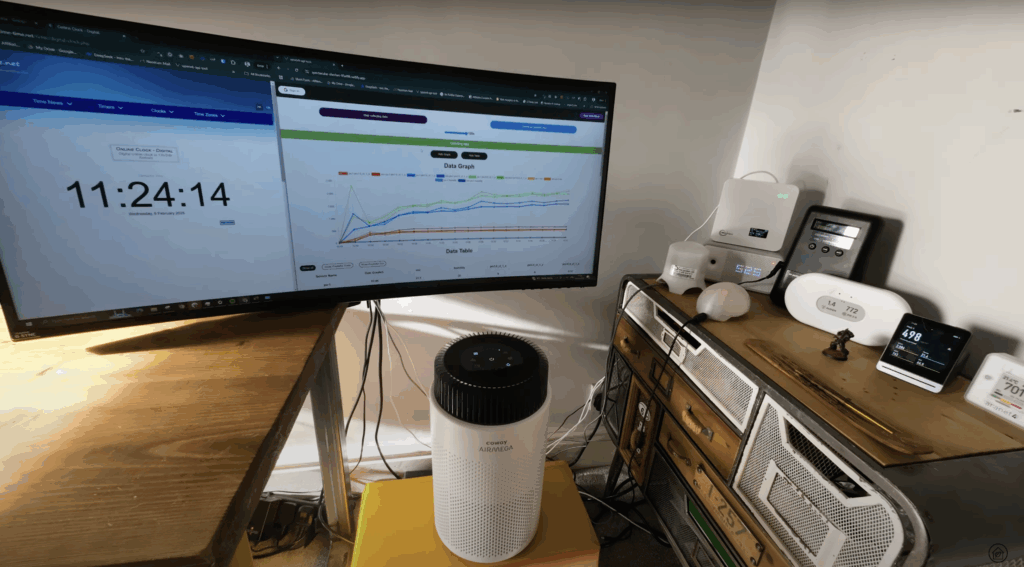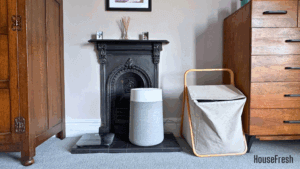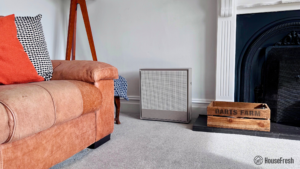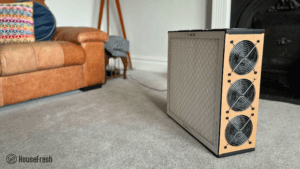IQAir was founded in 1963 by Klaus and lifelong asthmatic Manfred Hammes to reduce indoor air pollution from coal smoke from ovens that people used in their homes at the time. All IQAir air purifiers are manufactured in Switzerland and southern Germany, which makes IQAir stand out against its competitors, who mainly produce devices in China.
The Hammes family still owns the company and is now a significant player in the air purifier markets across the U.S. and China. You can even watch Frank Hammes step into a smoke chamber with only the IQAir HealthPro Plus to protect him!
This particular model that I am reviewing is the IQAir HealthPro Plus 250, which is priced at $899 and is at the higher end of the budget for most home users. That is why I will try to uncover whether the HealthPro Plus is worth its significant price tag — I don’t want anybody to buy this expensive air purifier and then regret it.
As with all the air purifiers we review here at HouseFresh, we bought the IQAir HealthPro Plus with our money to test its performance, noise levels generated and electricity consumption. We don’t run ads on our site or accept freebies, so all our reviews are impartial, and we have no issues saying when a product sucks or doesn’t provide value. We do all this to compare different air purifiers side by side.
In addition to running all these experiments in our test room, I have been using the unit in my home since 2022, so I can share my impressions of having an IQAir HealthPro Plus in real-life situations.
The lowdown on the IQAir Healthpro Plus

If you don’t have time to read my full review, you can just go through my pros and cons for a quick snapshot of my findings:
What we really like
What we think could be better
Before we jump into the stats, it’s worth taking the time to talk a little about CADR and CFM. The team at IQAir is not a fan of CADR as they believe it is biased in favor of hybrid units (those that use ionizer and HEPA). You can read more about their argument on IQAir’s blog.
In simple terms, IQAir doesn’t use any ionizer technology compared to others in this space (Blueair and Alen) due to health concerns and efficiency decreases from particle charging. While hybrid technology could clean the air quicker, if you have similar concerns about ozone or ionizers, you should look closely at something like the IQAir HealthPro Plus.
| HouseFresh rating: | ★★★★★ |
| Time to clean our 728 cubic feet test room (with the device running at top speed): | 28 minutes |
| Air purifier technology: | HyperHEPA and V50-CELL gas and odor filter |
| Recommended room size (5 air changes per hour): | 375 sq. ft. |
| Clean air delivery rate (CADR): | Estimated: 250 CFM |
| Dimensions (in inches / in cm): | 28H x 18W x 16D inches (71H x 38W x 41D cm) |
| Weight (in pounds / in kg): | 35 lbs (15.88 kg) |
| Filter life: | 4 years |
| Noise level (measured from 3 ft. away): | Speed 1: 36.9 dB Speed 2: 37.2 dB Speed 3: 40.9 dB Speed 4: 47.2 dB Speed 5: 53.9 dB Speed 6: 61.2 dB |
| Electricity consumption in watts (recorded with an electricity usage monitor): | Standby mode: 1 watts Speed 1: 16.5 watts Speed 2: 32.7 watts Speed 3: 47.3 watts Speed 4: 69 watts Speed 5: 94.3 watts Speed 6: 145.2 watts |
| Estimated running costs (electricity consumption + filter replacements): | $421.47 per year |
| Cost per CADR cfm (based on dust CFM as reported by AHAM): | $3.60 |
| Manufacturer’s warranty: | 10 years |
| Country of manufacture: | Switzerland / Germany |
Okay, maybe it does look like an 80s printer
“Is it a printer?” That was the first thing my wife said when she saw it.
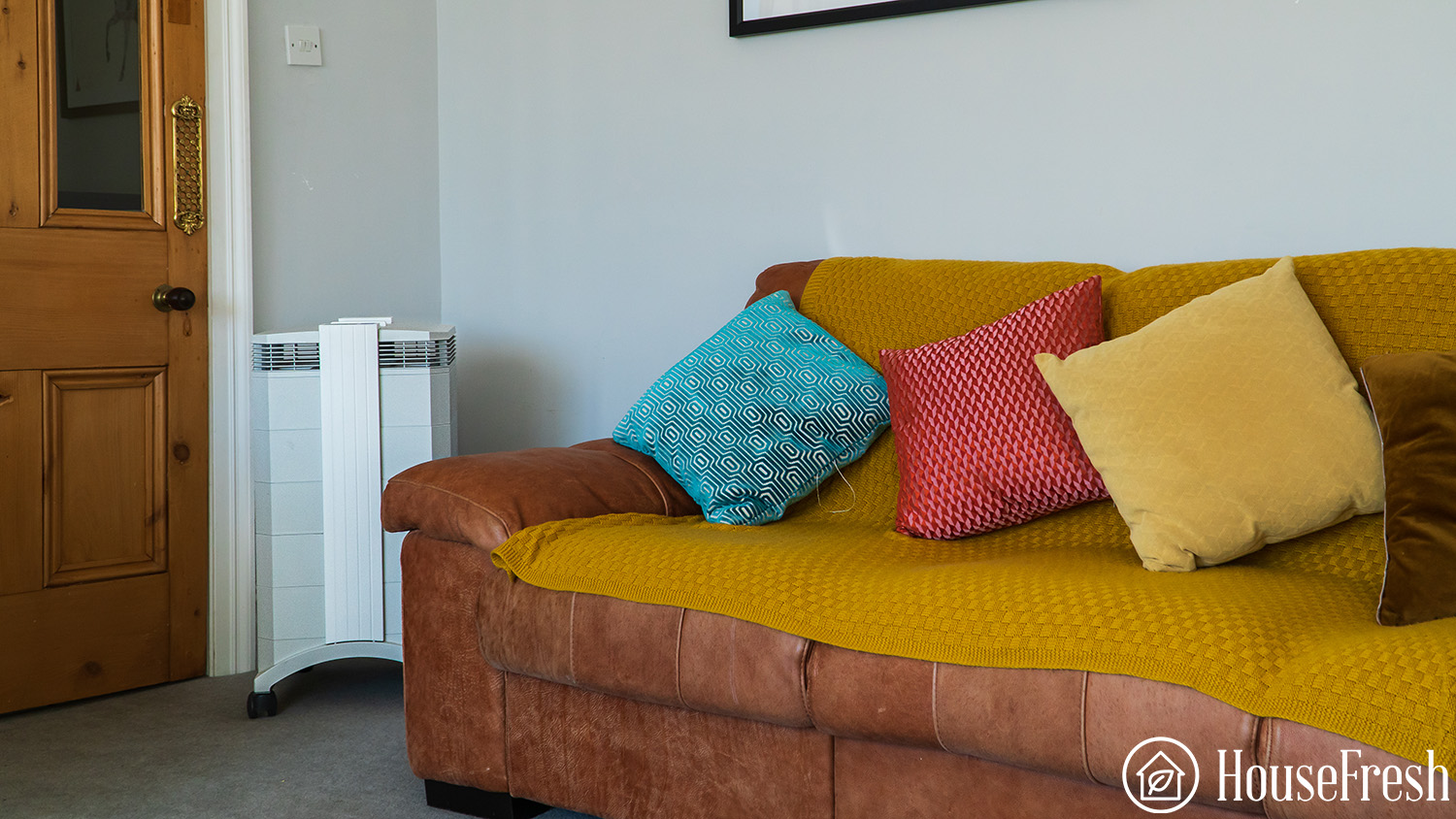
The IQAir HealthPro Plus gives off office printer/copier vibes, but that might not be a bad thing if you are into vintage electronics.
Once I saw the IQAir HealthPro Plus box, I knew a huge unit was inside, and you would need two people to help move the box. The IQAir HealthPro Plus comes well packaged in a large box and includes a remote, wheels, and power cable packed separately.
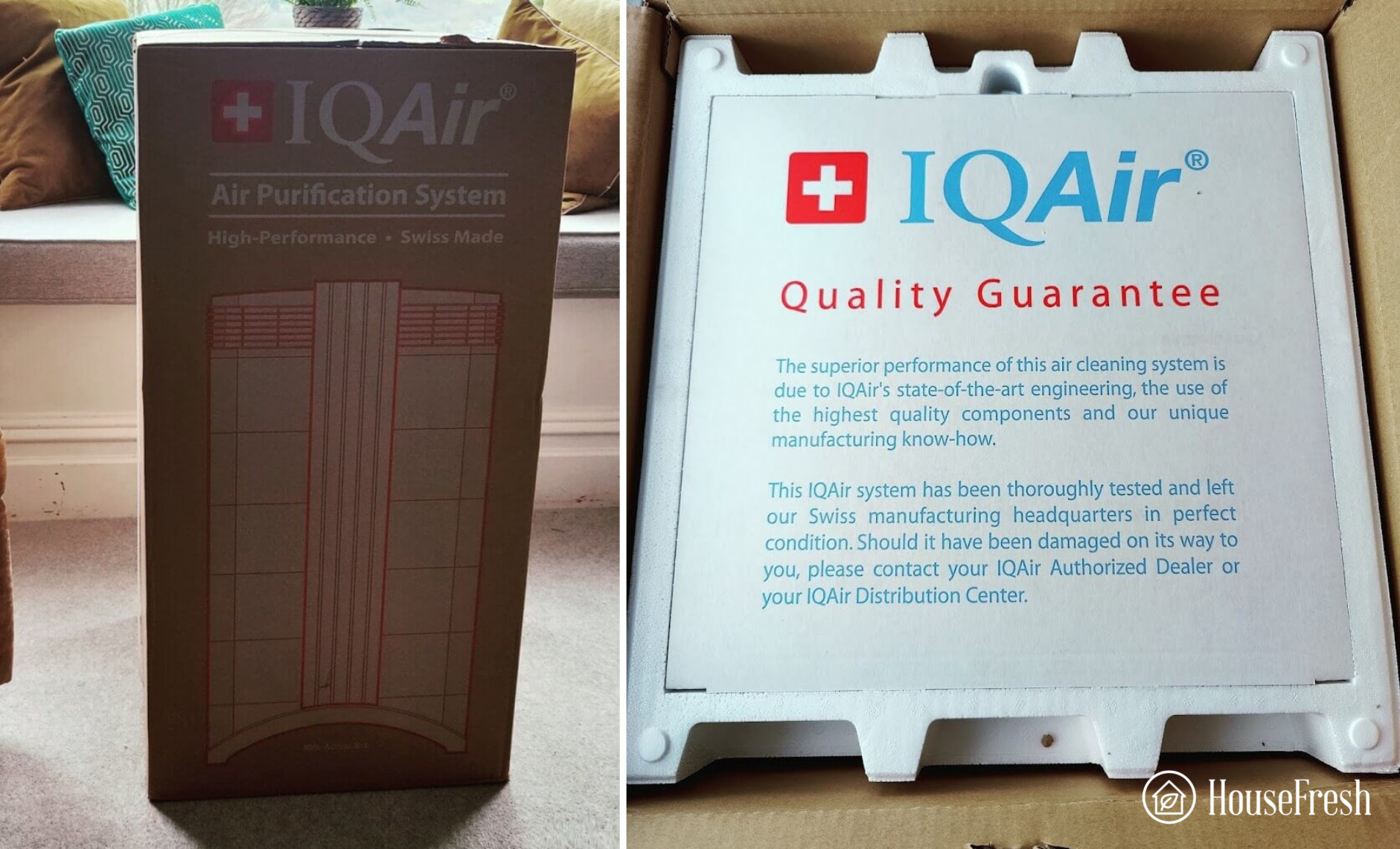
Inside the box, you can also find a certificate of performance.
IQAir’s team in Switzerland ensures that every unit is tested before it goes out to you. As you can see from the certificate, my unit performed better than the published rate, with Speed 6 providing 494 m3/h vs 440 m3/h.
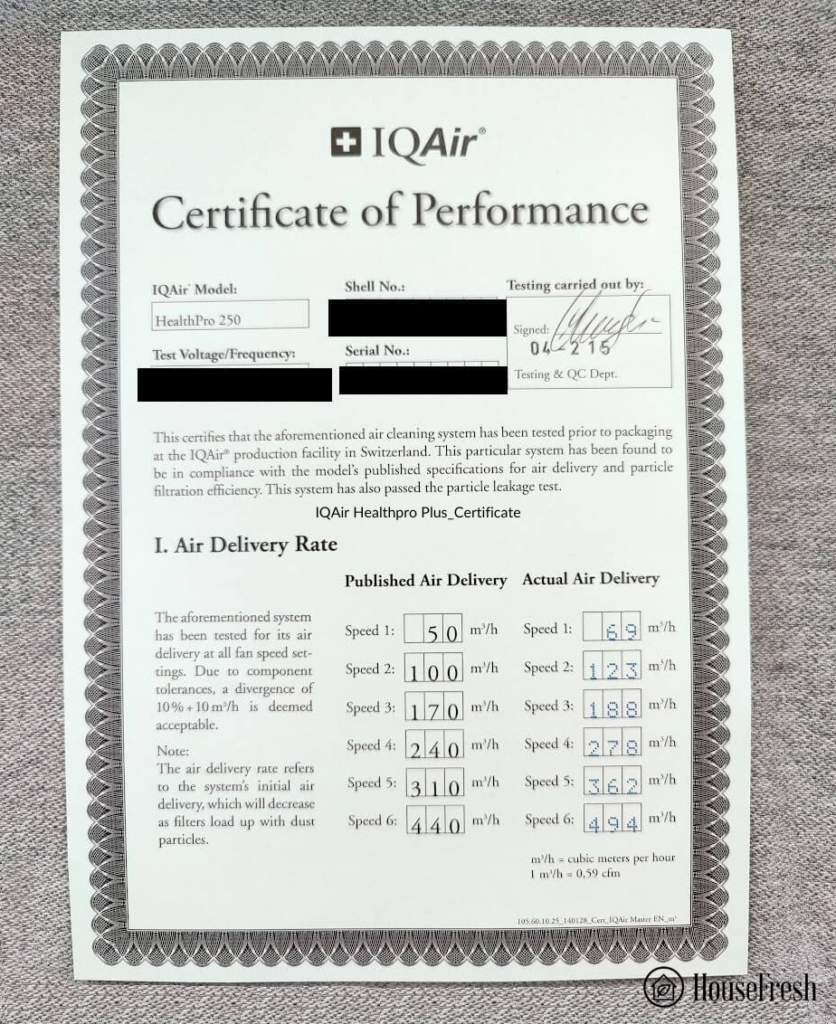
As I mentioned above, inside the box, you will also find the wheels, which you must attach to your HealthPro Plus yourself. You just need to connect the wheels to the brackets at the bottom of the unit, so it should be a straightforward job, right?
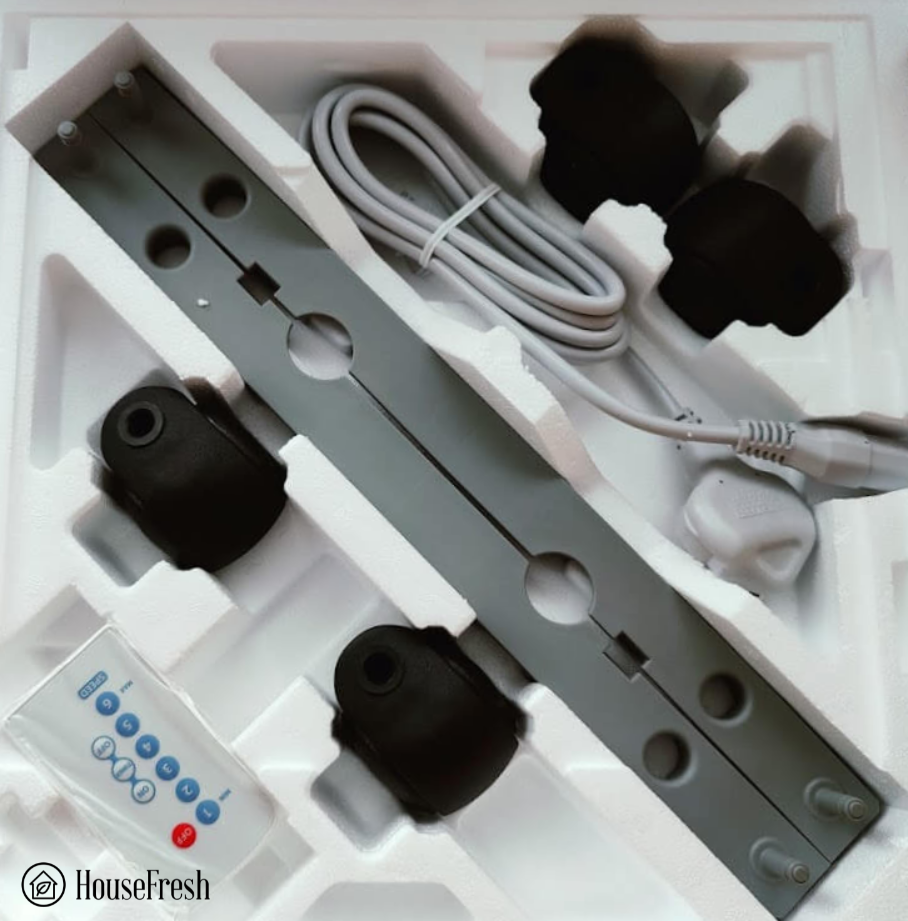
Unfortunately, it wasn’t a straightforward job for me.
Unlike most castor wheels, these didn’t just click into place with the brackets. I could only make the wheels click into place by putting my entire body weight onto the unit. Throughout this process, I was very worried about the possibility of breaking the whole thing.
This was the only complication I encountered when using the IQAir HealthPro Plus. I hope I don’t need to remove the wheels for whatever reason, as I worry they are now latched on super tightly and might break apart if I force them out. This is something that IQAir could improve in future versions.
Once the wheels were on, I could move the IQAir HealthPro Plus around the house to test its portability and closely inspect the unit.
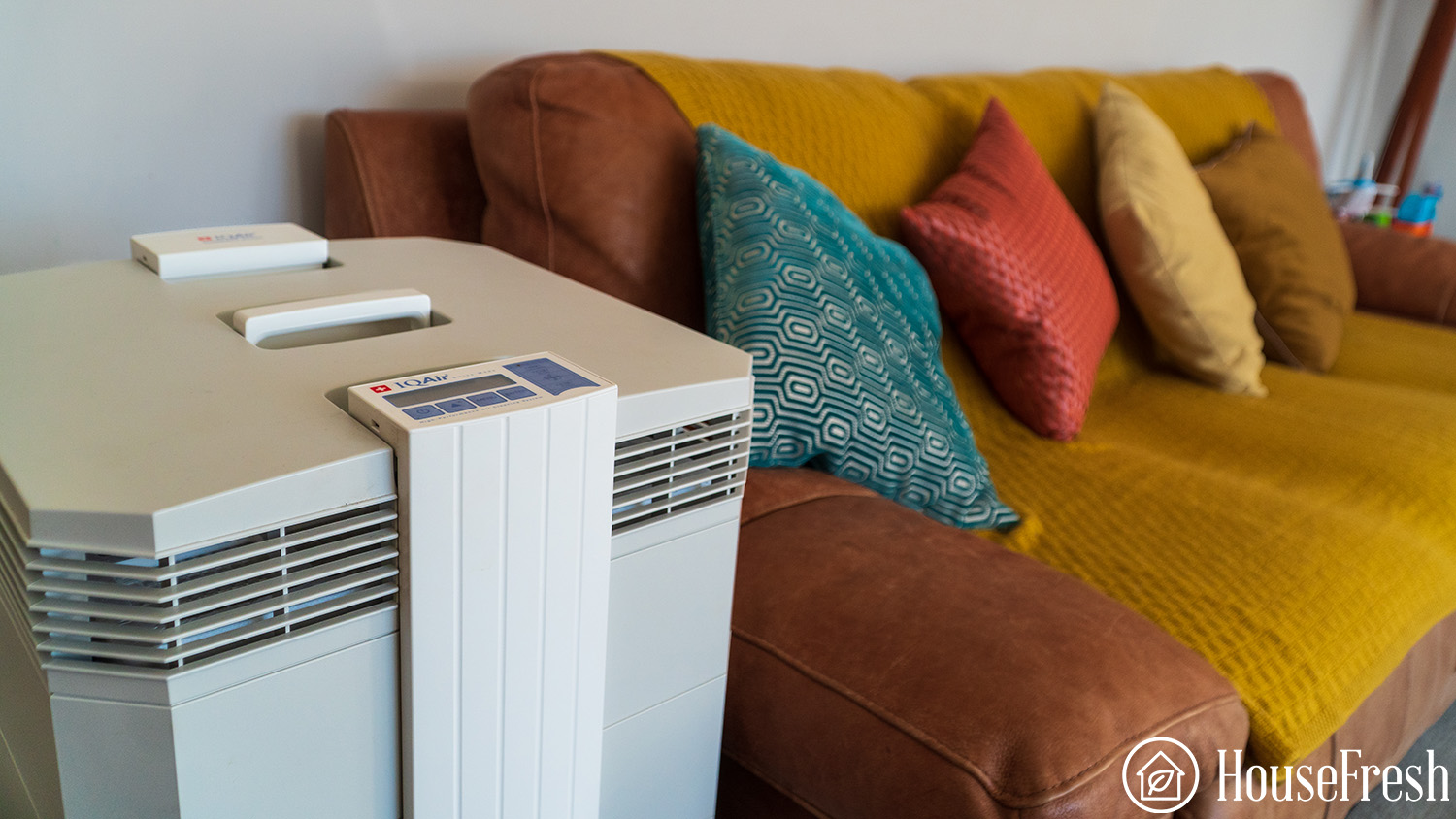
The main case is a thick plastic shell housing each filter with a fan at the bottom that draws air through the pre-filter and into the other filters.
Once I finished testing the air cleaning speed, electricity consumption and noise levels generated by the IQAir HealthPro Plus, I had to find a spot for it in my home as I was assigned to use this air purifier long-term to assess potential issues that could arise.
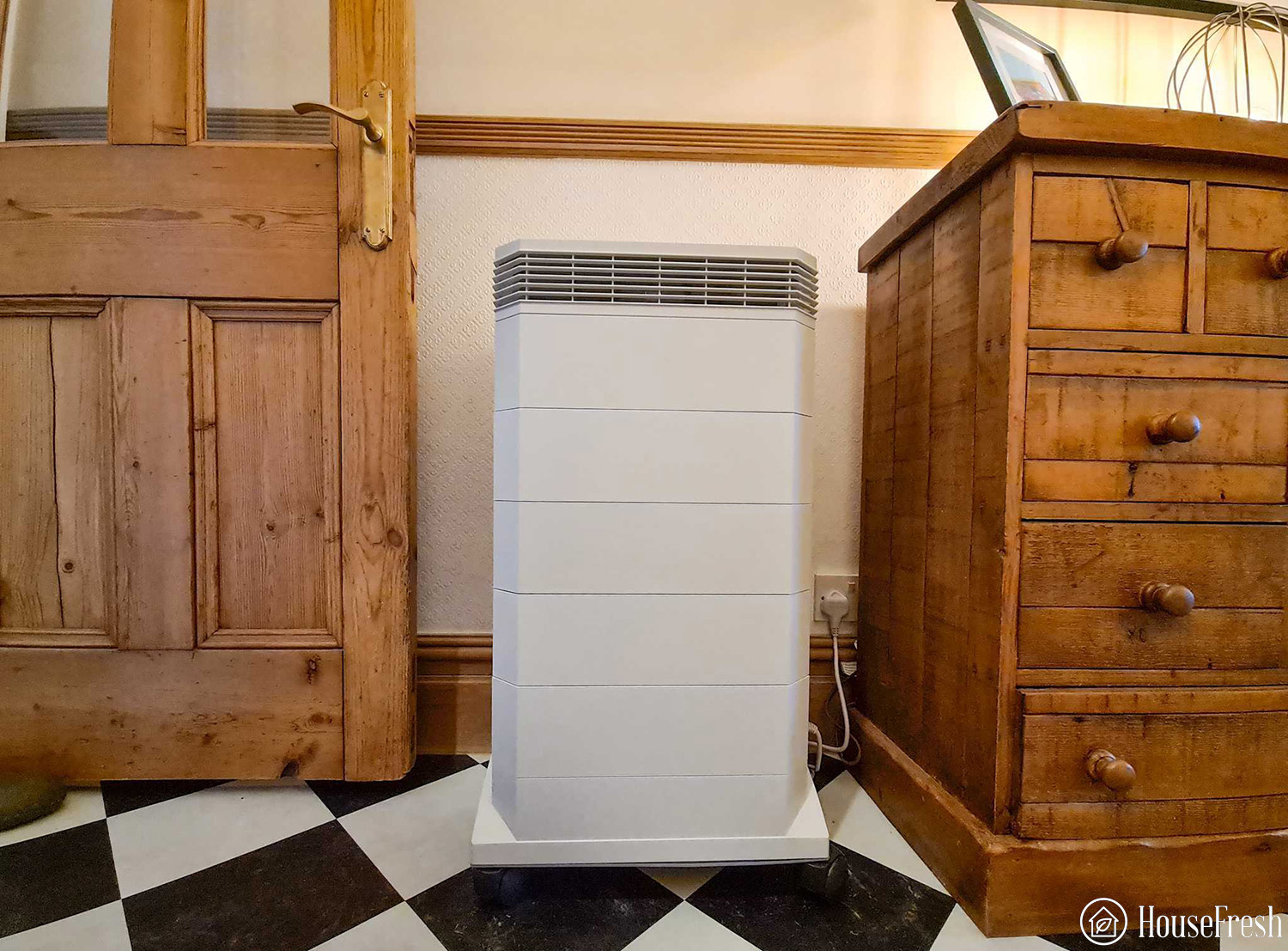
Right now, I have the HealthPro Plus in my hallway, and while it did get a strange look from my wife the first morning I set it up, it’s now a part of the house and doesn’t get in the way.
The positioning is great because it sits in the middle of the house, and it catches any cooking smells from the kitchen or the smoke from the wood burner in the TV room before they travel to the rest of the house.
Simple controls without smart functions
The buttons on the control panel at the top of the IQAir HealthPro Plus are easy to use, without unnecessary options or cryptic icons.
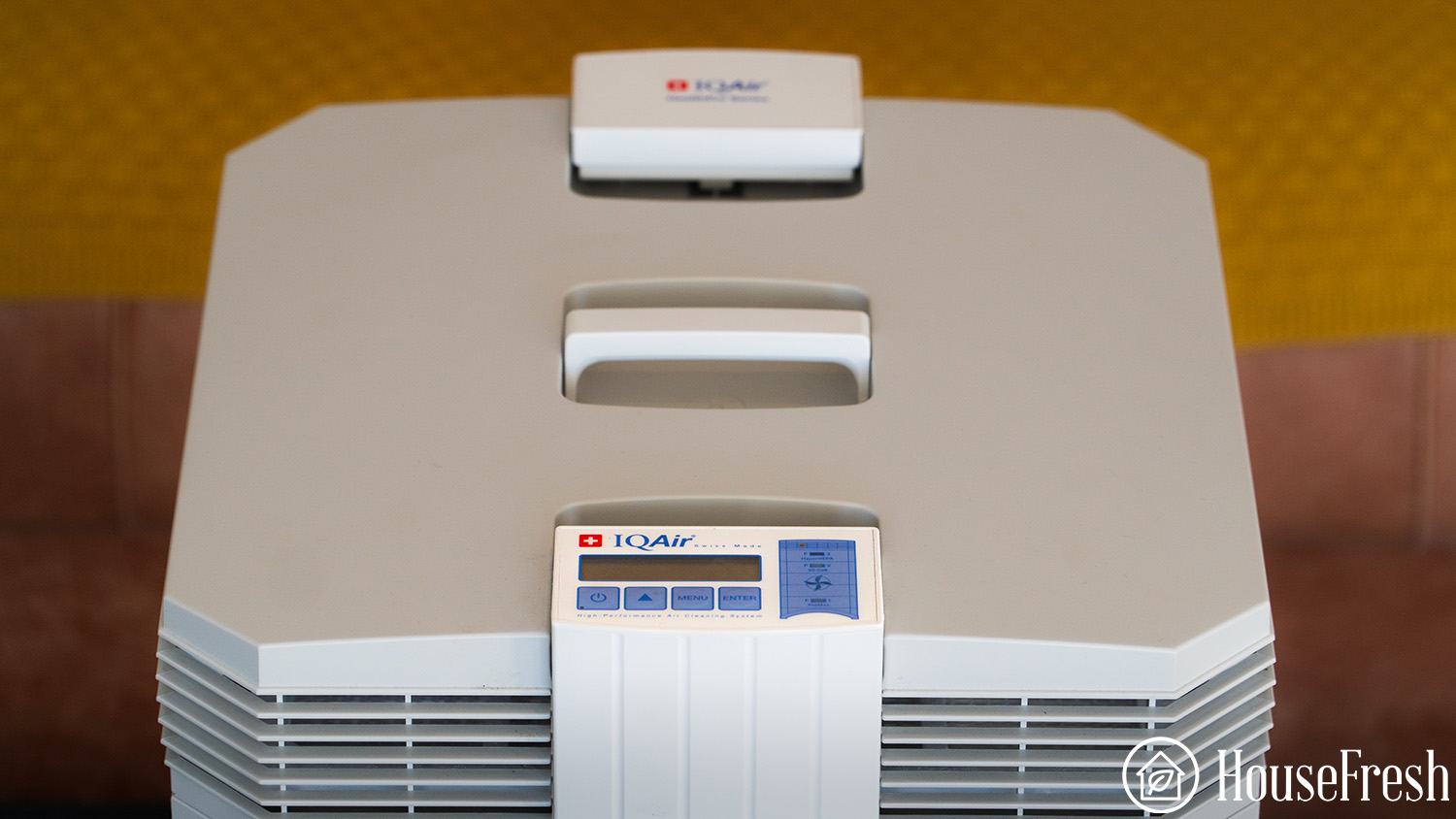
This reasonably simple system offers users the ability to increase fan speed with the touch of a button, and also check out the amount of time left in the filters before they need to be replaced. It’s a straightforward system compared to many more modern air purifiers with multiple screens and touch buttons.
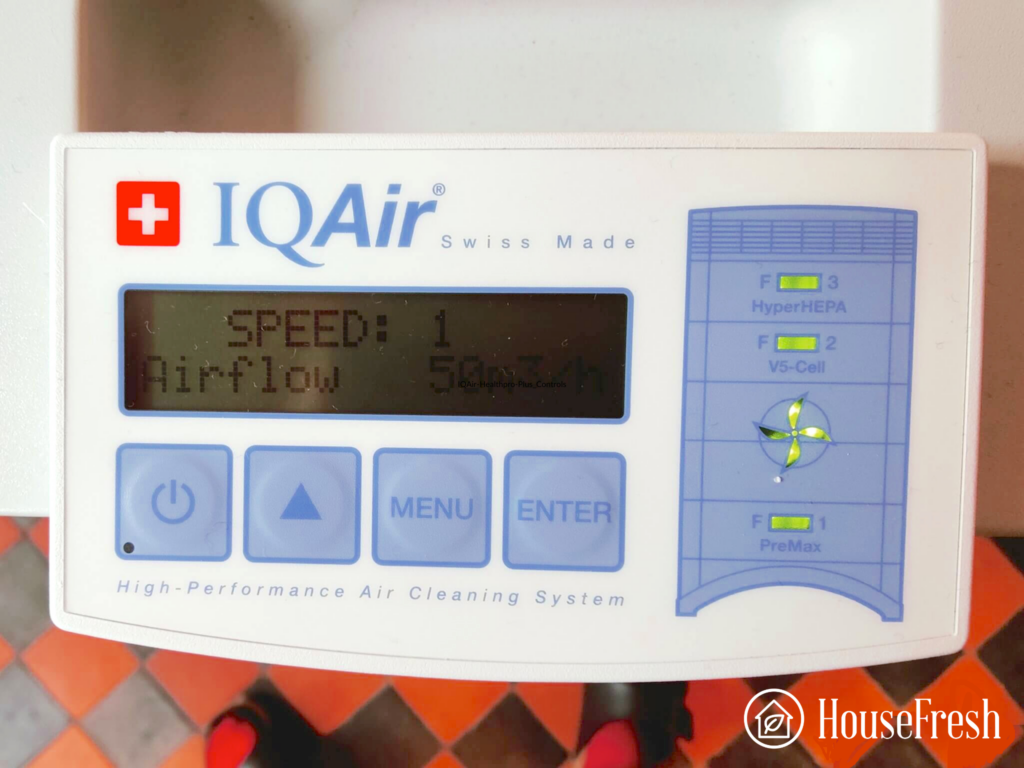
I was a little disappointed the IQAir HealthPro Plus doesn’t include a smart mode that would allow it to come on automatically when it senses pollutants in the air, but this is a technology that requires an onboard air quality sensor, and that isn’t available on this model.
IQAir has launched a smart air purifier model that includes an in-built air quality sensor and app support: the Atem X. It doesn’t come cheap at $1,399, but we are excited to test and review it before the end of this year.
That being said, the controls on the IQAir HealthPro Plus do include a timer button to program a routine for the air purifier to switch itself off at night or when you leave the house, for example. However, you have to set this manually daily, setting hours for the air purifier to turn on and off. Not ideal by any stretch.
Another thing that would be nice to have is a child lock. My youngest loves buttons, so it is not uncommon to find him turning the IQAir HealthPro Plus on and off.
On the plus side, the IQAir HealthPro Plus comes with a remote control that is a portable version of the control panel embedded at the top of the unit.
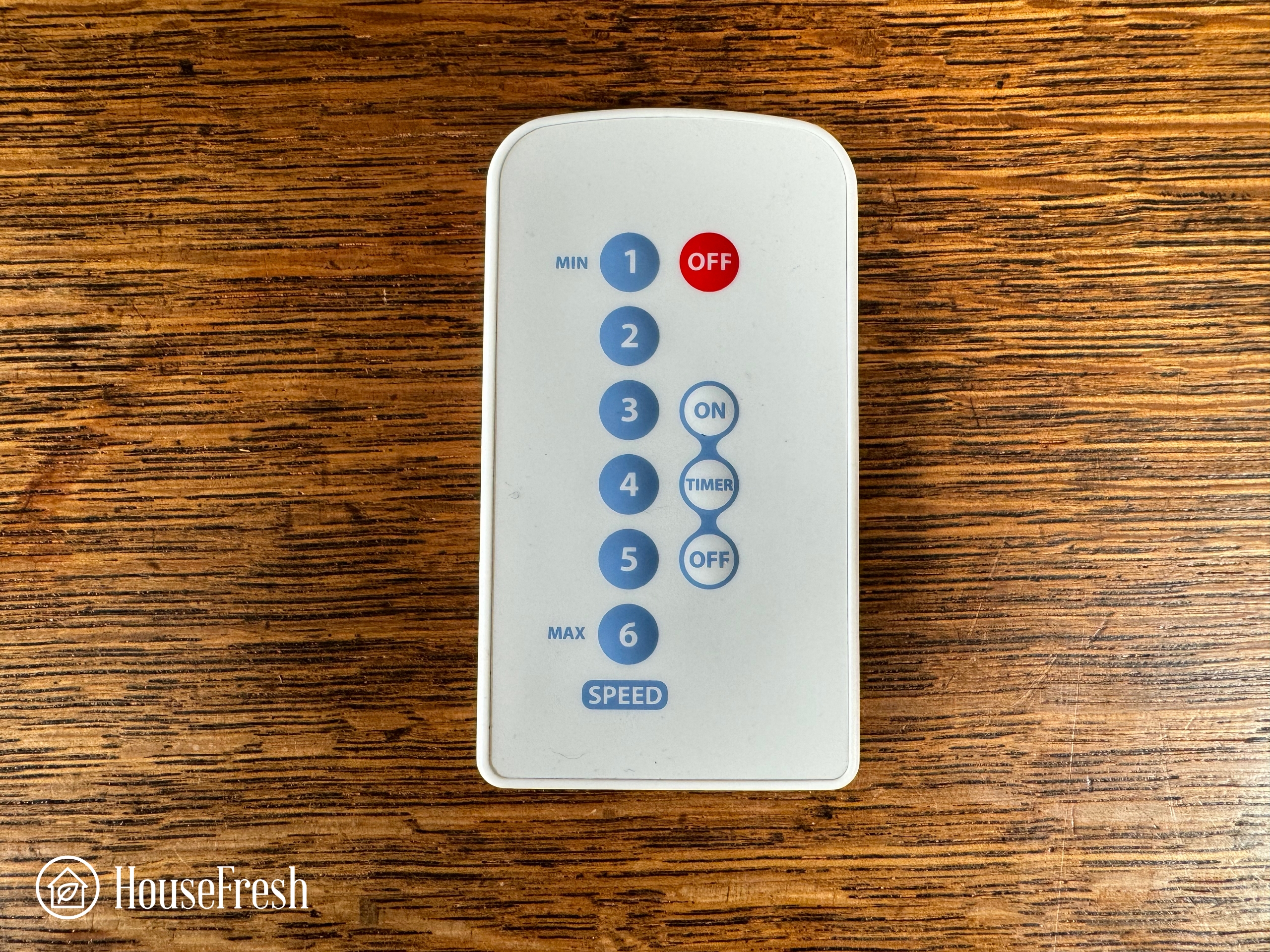
It’s a super simple remote, with buttons for all six fan speeds and to set the timer. I quickly stored it because I have small children who like to play with (and misplace) remote controls. I prefer to use the buttons on the control panel anyway.
Outstanding filter technology
A beast of an activated carbon filter with over 5 lbs of carbon and zeolite mix.
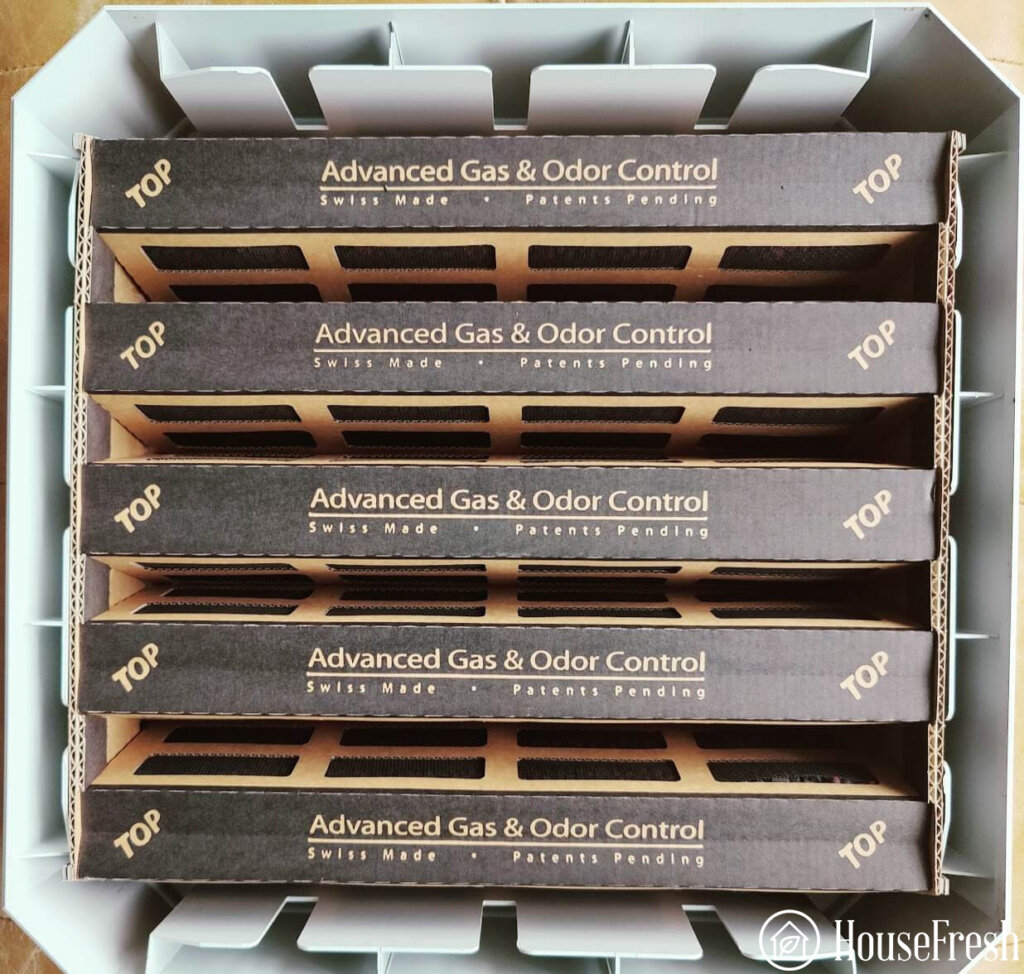
IQAir’s HyperHEPA filter is a beast.
The IQAir HealthPro Plus is heavy at 46Ibs, and I was worried about how much of that weight was wasted as part of the chassis. I was wrong.
This is not a large air purifier full of empty space. When I opened the top cover of the HealthPro Plus, I could see that the engineers at IQAir had used every inch to fill it with filters. This means that we will be getting a good amount of performance for the floor space it takes up.
The initial pre-filter stops large particles like pet dander and dust particles:
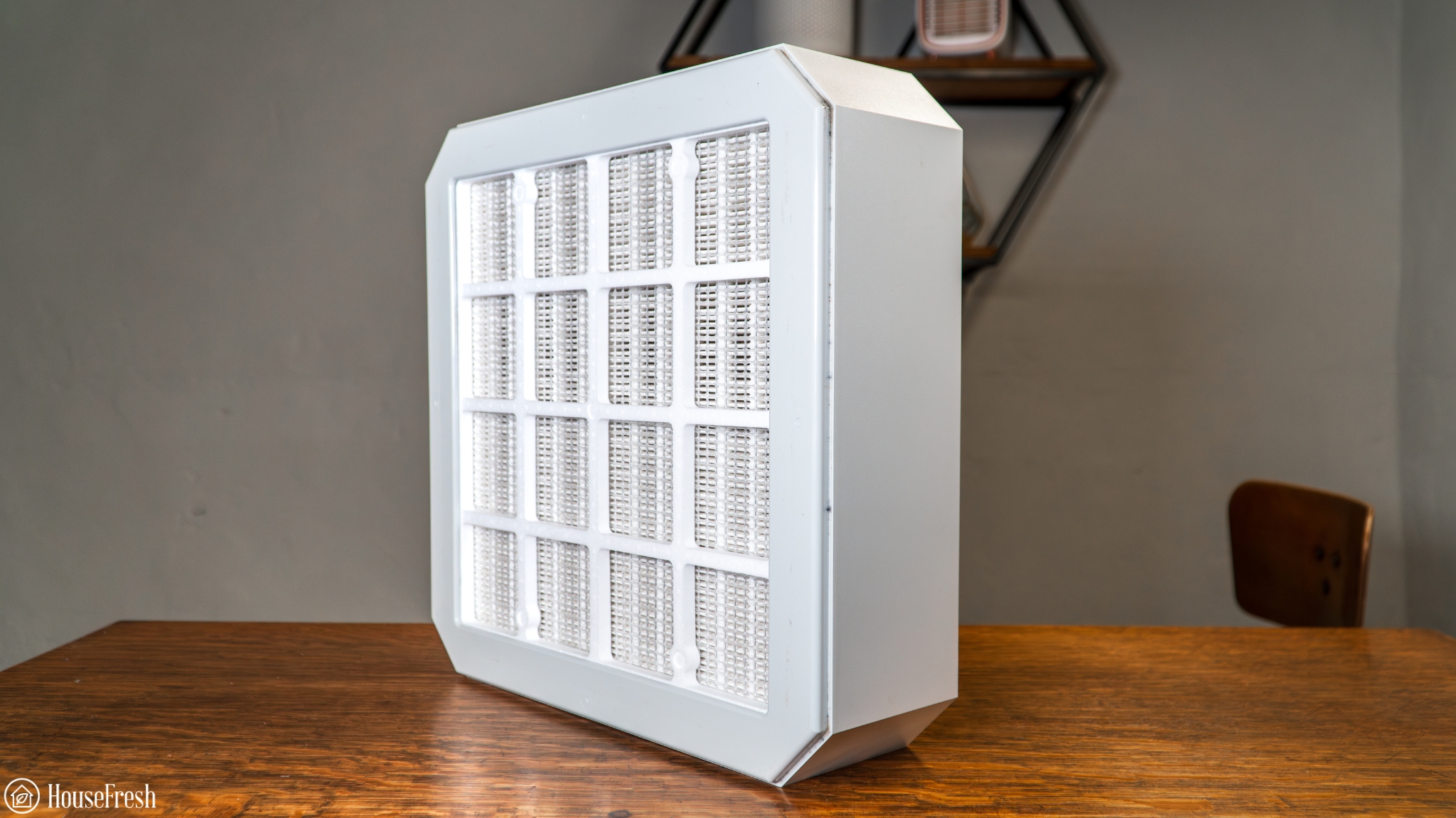
The air continues to be pulled into the fan, and as it passes through the V5-Cell, this next layer of filtration removes gas and odors:
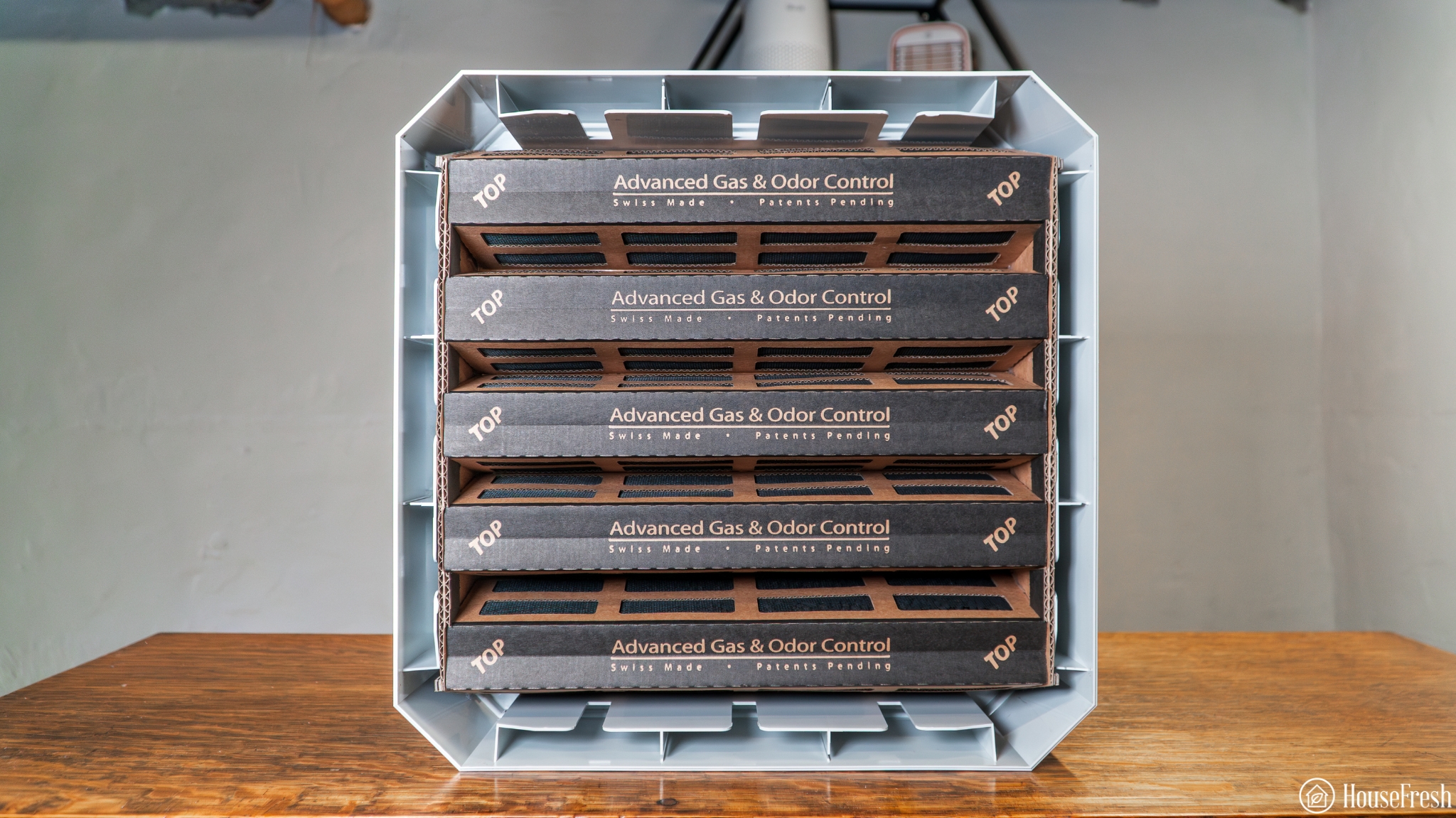
Upon closer inspection, one can see the individual pellets of activated carbon inside the V5-Cell Filter:
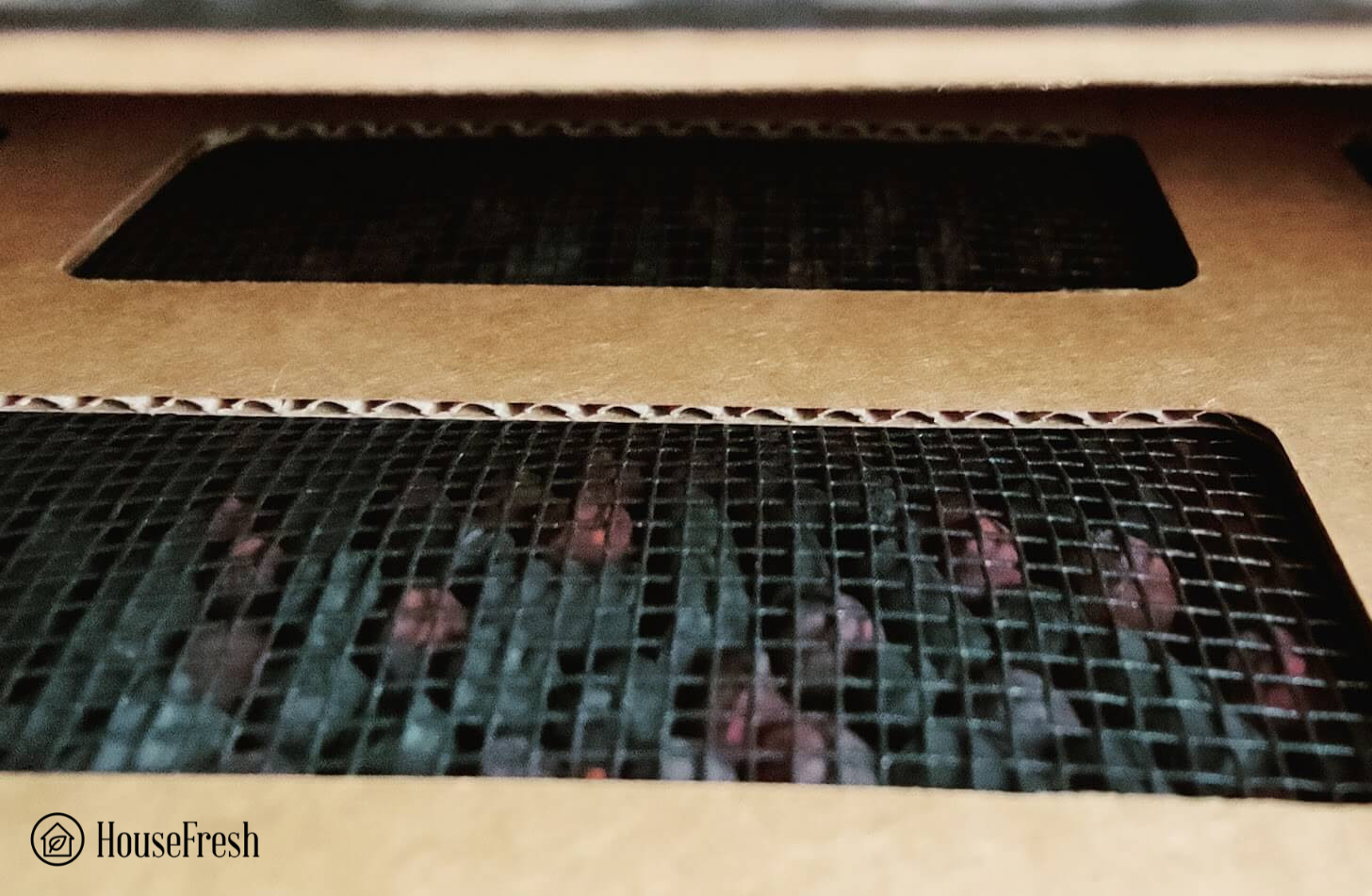
The V5-Cell filter is packed with over 5 lbs of activated carbon and KMn05 alumina, making it one of the most powerful air filters on the market to deal with odors and VOCs.
You can see here how it compares with the activated carbon filter on the Levoit EverestAir:
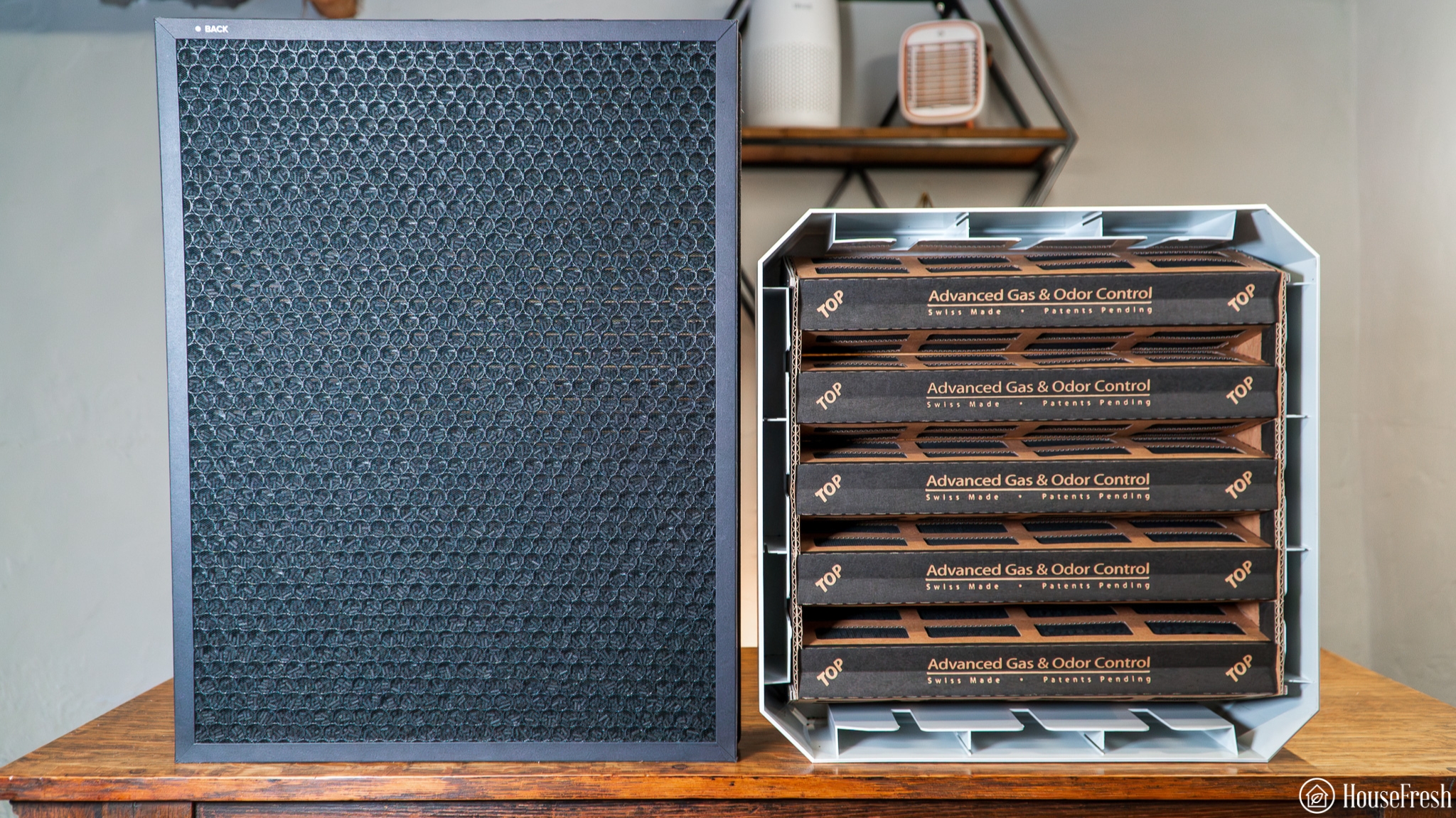
Once the air passes through the V5-Cell filter, it reaches the last layer of filtration, where the air is finally pushed through the primary HyperHEPA filter.
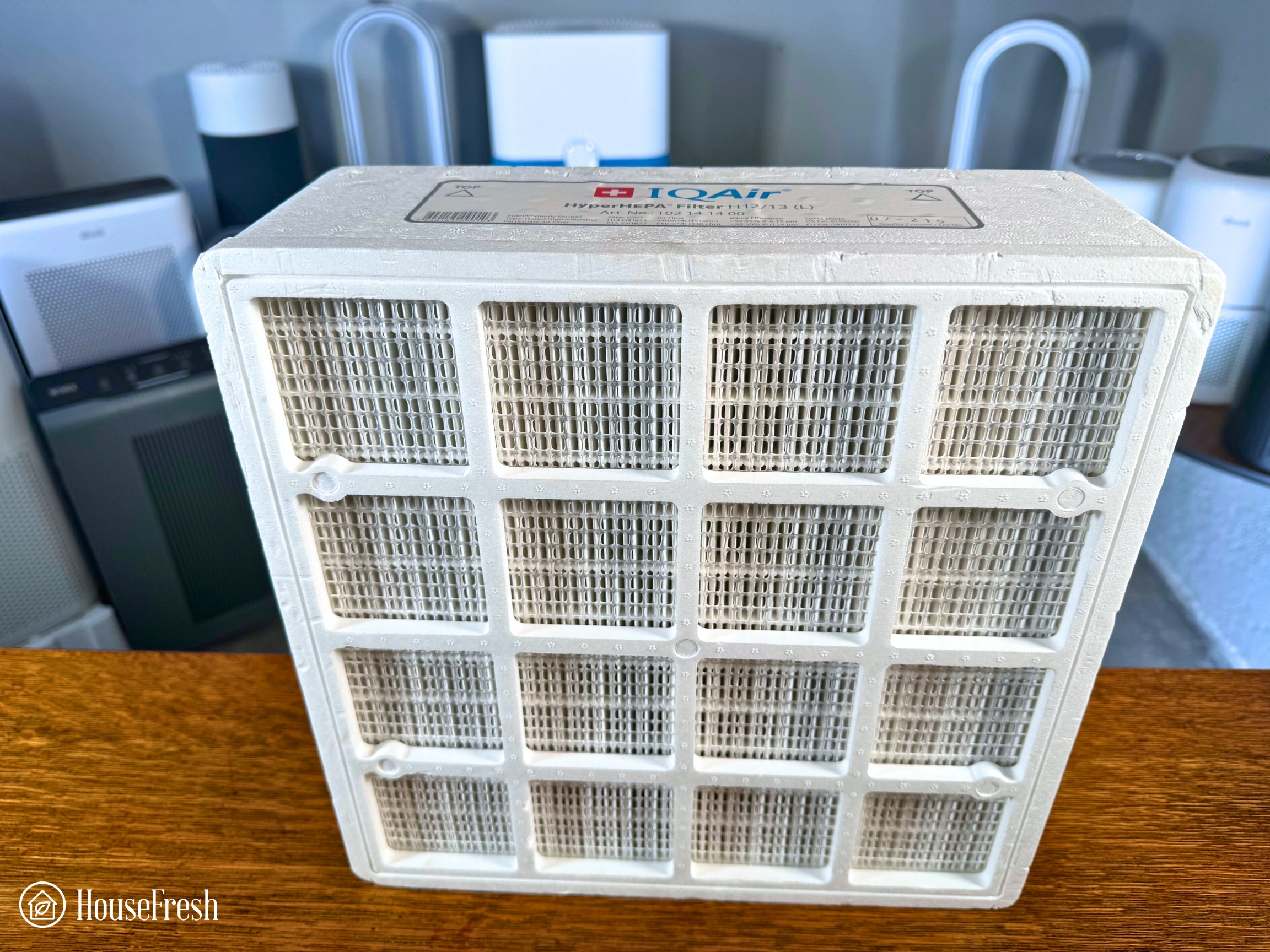
Using a high-grade filter like HyperHEPA adds to the device’s cost and means more energy is required to push enough air. But this is an excellent feature for those who want to ensure that only clean air is released from the device, such as those with serious health issues or in a hospital setting.
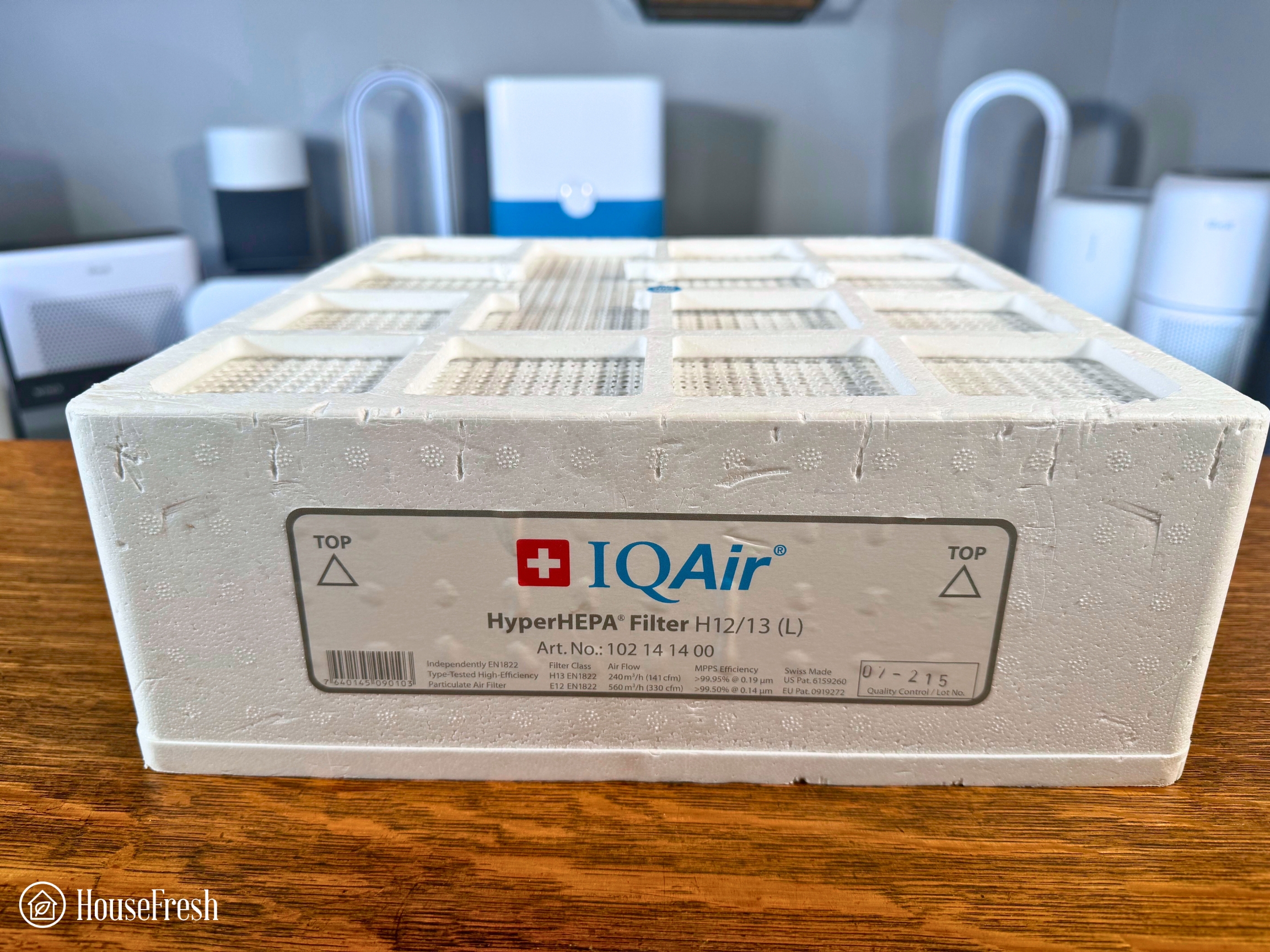
The benefit of this layout is that only pre-cleaned air passes through the most expensive HyperHEPA filter, which can be found for around $200 (the pre-filter is half that price.)
According to IQAir, you must replace the pre-filter every 18 months. Still, you only have to replace the HyperHEPA every four years, which compares favorably to other high-end air purifiers.
You can see in the video below how the process for replacing the filters goes:
As the case with Levoit showed us, many manufacturers will say that a filter is HEPA grade but often do prove it with third-party lab reports. We have no worries about the IQAir HealthPro Plus as Interbasic Resources, Inc. did third-party testing on it and made the report available to the public.
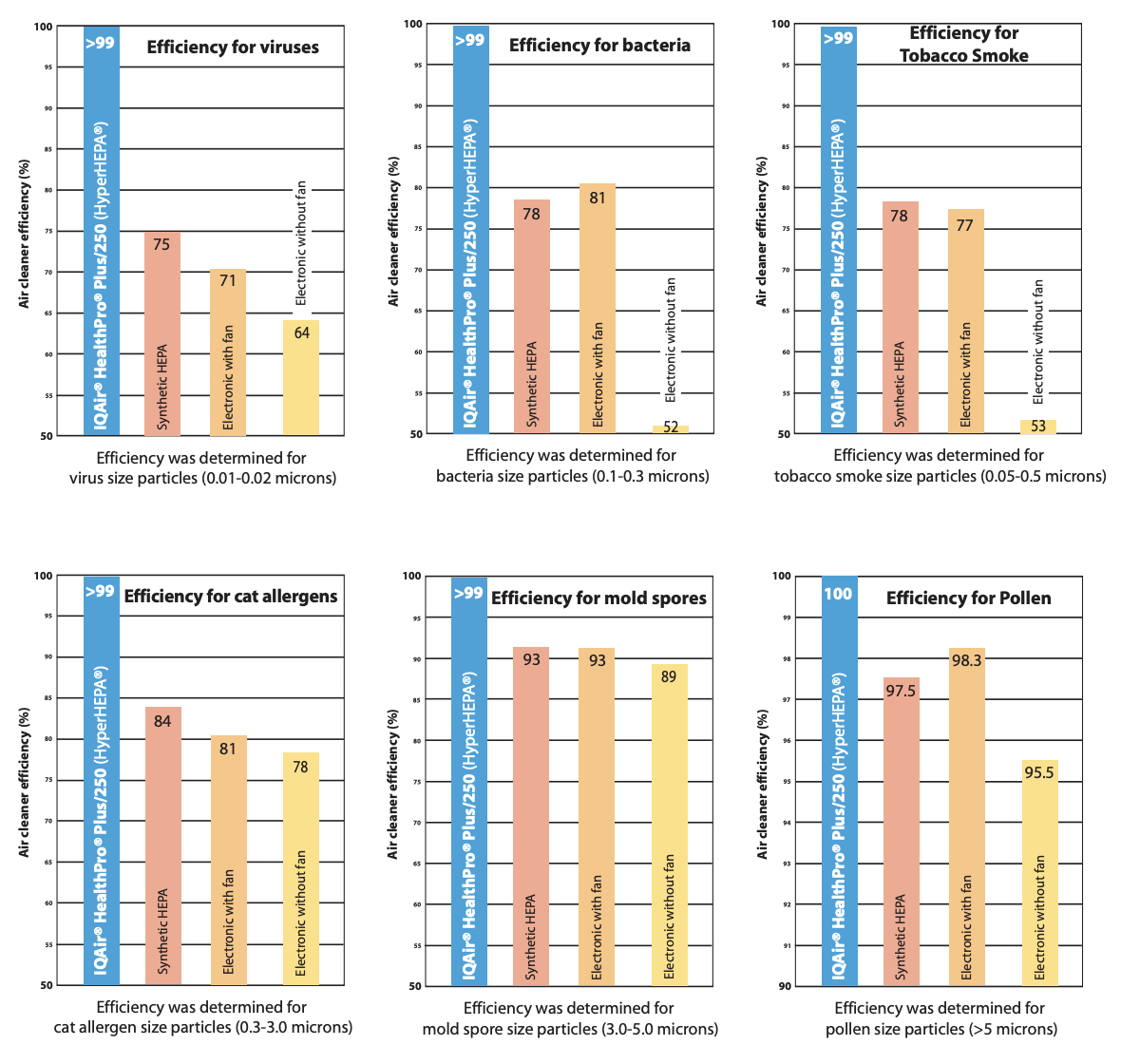
They compared the effectiveness of the HyperHEPA filters with other air cleaning technologies (synthetic HEPA, fan-powered electronic air cleaners and electronic air cleaners without a fan) across a range of different particles, from viruses to pollen. IQAir’s HyperHEPA was able to sustain 99-100% removal efficiency.
That said, this is not a requirement for most consumers just looking to reduce the number of particles in the air, as standard synthetic filtered devices can eventually clean the air in the room with multiple passes through the filter.
The IQAir HealthPro Plus cleared our test room in 28 minutes
Considering the amount of carbon this air purifier uses, its particle removal is impressive.
As I mentioned at the beginning of this review, we always test every air purifier performing the same job (cleaning the air from pollutants emitted by a powerful incense stick) under the same conditions in the same test room of 728 cubic feet and tracking PM1, PM2.5 and PM10 using two PurpleAir air quality sensors.
We do this because it allows us to compare different air purifiers like-for-like and calculate estimates of CADR even when manufacturers don’t provide it, which is the case with IQAir.
The IQAir HealthPro Plus took 28 minutes to return the room to a reading of zero PM1 when tracked using the PurpleAir indoor sensor and 28 minutes to achieve PM1 zero with our newer Purple Zen sensor.
From an air cleaning performance perspective, the IQAir HealthPro Plus performed as well as I expected, especially when we consider the high-grade HEPA and large amounts of activated carbon used. I can now understand why IQAir CEO Frank Hammes was so confident about using this air purifier as his primary air supply in this video, where he is locked in a smoke chamber.
The table below allows you to compare the performance of the IQAir HealthPro Plus against similarly priced or sized units, including the fastest air purifiers we have tested:
| AIR PURIFIER MODEL | TIME TO REACH PM1 ZERO AT FULL SPEED | LIST PRICE |
|---|---|---|
| Smart Air Blast Mini MKII | 15 minutes | $649.00 |
| Levoit EverestAir | 16 minutes | $499.99 |
| Alen BreatheSmart 45i | 30 minutes | $429.00 |
| Winix 5500-2 | 23 minutes | $249.99 |
| Rabbit Air A3 | 24 minutes | $749.95 |
| Coway Airmega AP-1512hh Mighty | 26 minutes | $229.99 |
| IQAir HealthPro Plus | 28 minutes | $1000.00 |
| AirDoctor 3000 | 30 minutes | $519.00 |
| Austin Air HealthMate | 52 minutes | $756.00 |
The HeathPro Plus completed our particle removal test 27 minutes faster than the Austin Air HealthMate when removing PM incense smoke pollutants inside our small 728 cubic feet test room.
Airflow test results
We also used our Testo 410i anemometer to measure directly from the air outlet how fast the airflow is at each fan speed when taken directly from the device.
We found that at speed one, airflow averaged 0.5 m/s, and at speed six, it achieved 3.65 m/s. It is worth mentioning that I measured the airflow one year after setting up the HealthPro Plus in my hallway to ensure it would perform at its best as the filters have been ‘broken into’.
You can see the sheer power of the IQAir HealthPro Plus by looking at how quickly the air sensor changes when put close to the airflow exit on this air purifier in the video below:
Noise levels test results
These are the results for each fan speed from 3ft away:
| Speed | Sound Level |
| 1 | 36.9 dB |
| 2 | 37.2 dB |
| 3 | 40.9 dB |
| 4 | 47.2 dB |
| 5 | 53.9 dB |
| 6 | 61.2 dB |
Here is how the IQAir HealthPro Plus compares against units with a similar air-cleaning performance in regards to noise output:
| AIR PURIFIER MODEL | SOUND LEVEL AT TOP SPEED (dB) | TIME TO CLEAN OUR TEST ROOM |
|---|---|---|
| Coway Airmega AP-1512hh Mighty | 60.1 dB | 25 minutes |
| Austin Air HealthMate HM400 | 61.5 dB | 37 minutes |
| Okaysou AirMax10L Pro | 55.6 dB | 44 minutes |
| Levoit Vital 200S | 57.7 dB | 18 minutes |
| IQAir Healthpro Plus | 61.2 dB | 26 minutes |
If you are interested in hearing the noise to find out just how loud the IQAir Health Pro Plus is, then be sure to check out the video below, which shows noise levels generated by the unit as you move from the lowest to the highest speed levels:
The cost to run an IQAir HealthPro Plus: $421.47 per year
The powerful fan and high-quality filters don’t come cheap.
A big unit like this does cost a lot more in the initial outlay, but another thing to consider is the extra costs for electricity and filters.
1. Electricity costs = $221.47 per year
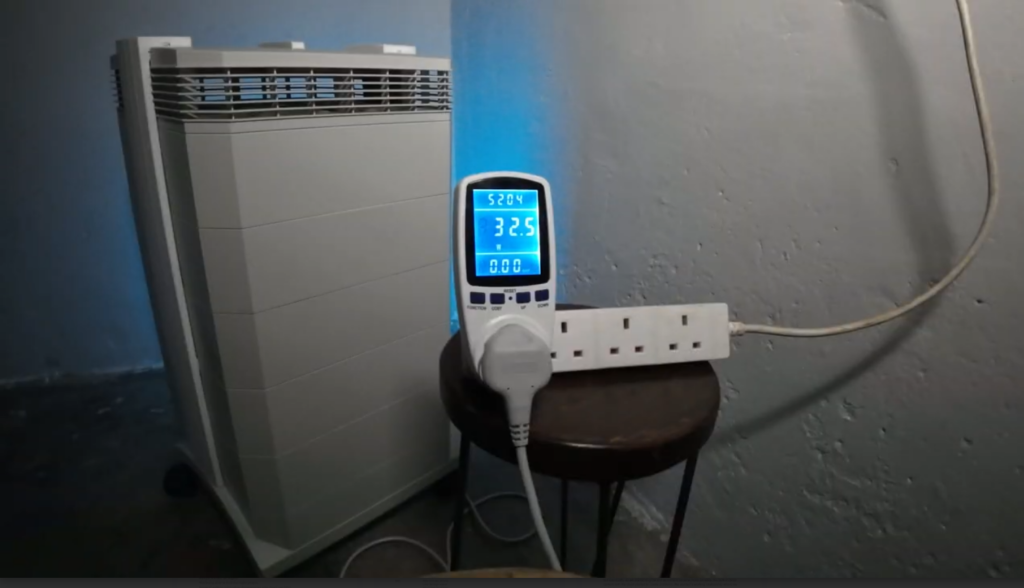
Rather than take the averages from the manufacturer’s website, I tested the electricity usage for each different speed for this air purifier.
| Fan speed | Energy consumed |
| 1 | 16.5 watts |
| 2 | 32.7 watts |
| 3 | 47.3 watts |
| 4 | 69 watts |
| 5 | 94.3 watts |
| 6 | 145.2 watts |
This air purifier will cost $221.47 per year at its highest fan speed, based on my calculations using the latest average electricity price per kWh reported by the U.S. Bureau of Labor Statistics and assuming you would run the HealthPro Plus 24/7.
Compared to other devices, the IQAir Healthpro is more power-hungry than many of the devices we have tested:
| AIR PURIFIER MODEL | ENERGY CONSUMPTION AT TOP SPEED (watts) | TIME TO CLEAN OUR TEST ROOM |
|---|---|---|
| Coway Airmega AP-1512hh Mighty | 77.3 watts | 25 minutes |
| Austin Air HealthMate HM400 | 147.6 watts | 37 minutes |
| Okaysou AirMax10L Pro | 58.05 watts | 44 minutes |
| Levoit Vital 200S | 44.55 watts | 18 minutes |
| IQAir Health Pro Plus | 145.5 watts | 26 minutes |
2. Filter costs = $200 per year
Another area to consider is the costs associated with replacing the filters.
- The original IQAir pre-filter is available for $155.78. Remember, it needs to be changed every 18 months.
- The genuine IQAir HyperHEPA costs $199.00, but it only needs to be replaced every four years.
- IQAir’s V5-Cell Gas and Odor Control Filter lasts up to two years, and it costs $99 when writing this review.
The good news is that generic filters that fit the IQAir HealthPro Plus, with packages of all three, including V5 and HyperHEPA, come in at $249.95.
That said, IQAir does not build these filters, so their performance may differ, and they will likely not put these through the same lab tests to certify the HEPA grade.
While you would hopefully not have to change all the filters every year, you would expect to budget at least $200 per year for filter running costs on top of the unit’s costs, which is at the highest level compared to other air purifiers we have reviewed.
Now, let’s compare the running costs of the HealthPro Plus against the costs we estimate for other units:
| AIR PURIFIER MODEL | ESTIMATED ELECTRICITY COST (per year) | FILTER REPLACEMENT COST (per year) | YEARLY MAINTENANCE COST |
|---|---|---|---|
| Coway Airmega AP-1512hh Mighty | $83.64 | $39.99 | $123.63 |
| Winix 5500-2 | $57.82 | $79.99 | $137.81 |
| Levoit EverestAir | $73.58 | $99.99 | $173.57 |
| Smart Air SA600 | $56.55 | $141.47 | $198.02 |
| AirDoctor 3000 | $104.63 | $178.00 | $282.63 |
| Austin Air HealthMate | $164.39 | $57.90 | $283.03 |
| Smart Air Blast Mini MKII | $136.29 | $236.99 | $373.28 |
| IQAir HealthPro Plus | $221.47 | $200.00 | $421.47 |
Bottom line: Is the IQAir HealthPro Plus worth it?
I had high expectations for the IQAir HealthPro Plus, and its performance in our real-world tests didn’t disappoint.
Yes, it isn’t cheap, but any level of performance of 250 CFM doesn’t come cheap with comparable high-performance units such as the Blueair Classic 605 at $799.99 and the Alen BreatheSmart 75i at $749. These units can perform at this level for less money due to their hybrid use of an ionizer combined with a HEPA filter.
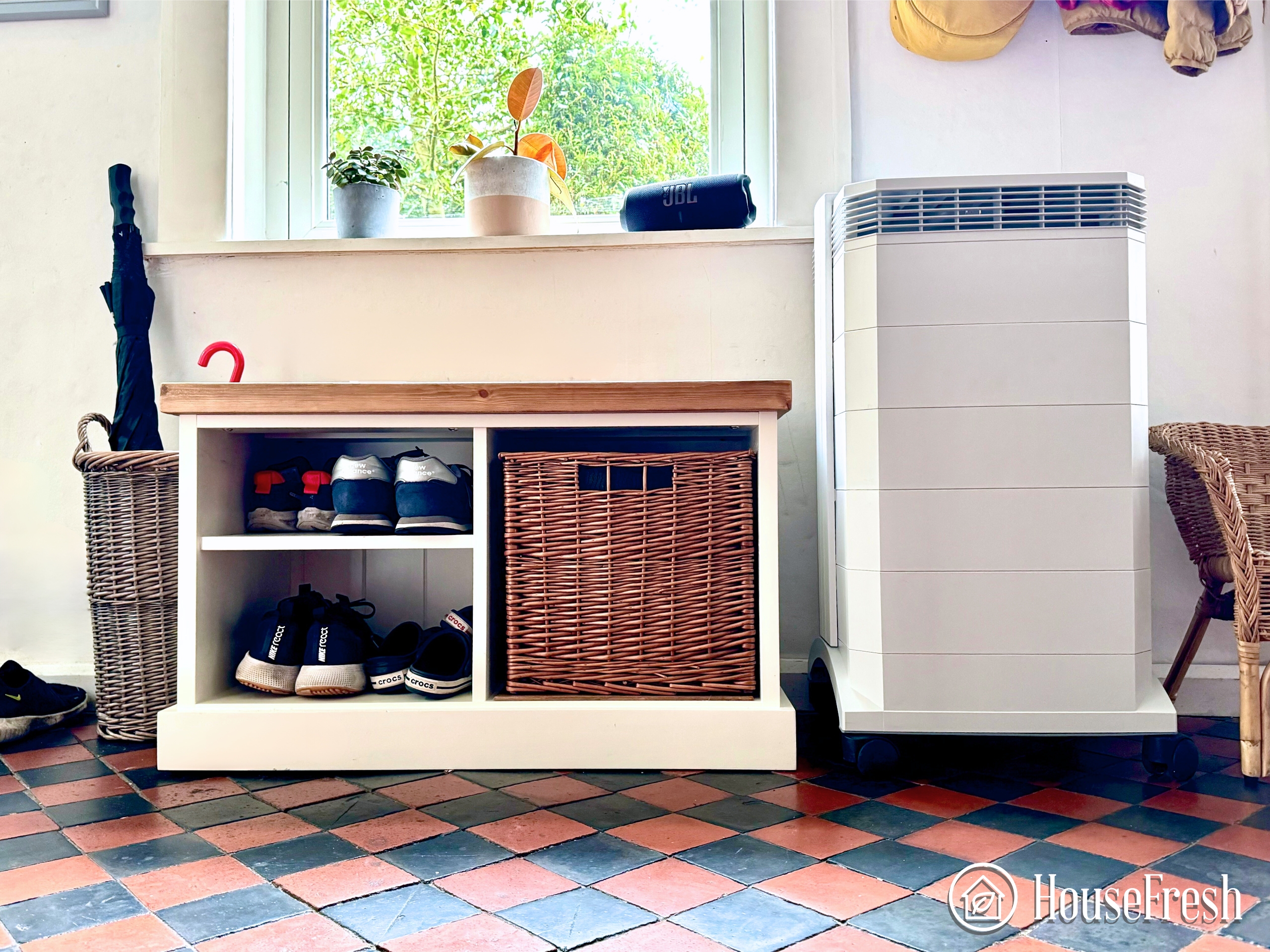
IQAir is clear that they don’t recommend ionizer technology, but I could understand situations where you would benefit from this extra power without the extra cost of a pure HEPA and activated charcoal system, such as cases when you are dealing with large amounts of smoke.
Whether you should get a unit like the IQAir HealthPro Plus depends on your position on using hybrid systems that utilize ionizers and your health issues. If you have any concerns about ionizers or specific health concerns, then the HealthPro Plus is currently the most powerful HEPA + Activated Charcoal air purifier on the market.
Suppose you don’t want to get the odor and VOC filter. In that case, you can buy a version that has a more powerful HyperHEPA performance at $50 less, which is the IQAir HealthPro (no plus) and IQAir HealthPro Compact — both of them might make more sense, depending on your specific use case.
SOURCES
We calculated yearly costs associated with running the IQAir HealthPro Plus for 24 hours a day, 365 days a year utilizing the latest average energy prices as reported by the Bureau of Labor Statistics of $0.174/kWh as of April 2024.


